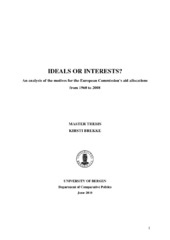Ideals or interests? An analysis of the motives for the European Commission's aid allocations from 1960 to 2008
Master thesis
Permanent lenke
https://hdl.handle.net/1956/4178Utgivelsesdato
2010-06-03Metadata
Vis full innførselSamlinger
Sammendrag
The aim of this thesis is to understand the motives of the European Union (EU) as a multilateral donor and whether its aid allocations are in accordance with the stated goals and objectives. The research question is: Which motives determine the aid allocations of the European Commission, and are the allocations in accordance with its stated goals? The research question's relevance lies in the fact that the EC is the world's largest multilateral donor. Also, the international donor community is setting new and ambitious goals to work together for poverty eradication, such as with the Millennium Development Goals (MDGs). Furthermore, the EU is different from other multilateral donors as it is based on a regional constituency. It thus becomes necessary to evaluate whether the goals of the donor or its own strategic interests determine the direction of aid flows. The theory states a three-fold of donor motives: recipient needs, strategic interests and recipient merits. Moreover, theoretical postulations indicate that multilateral donors are more likely to follow their goals than bilateral donors, as they are supposed to be independent of member states' interests. Nevertheless, the theory also states that multilateral donors are likely to be influenced by major shareholders or the aggregate of member states' interests. To answer the research question, the thesis conducts a qualitative case study of the European Union as a multilateral donor. The analysis is based on data on aid flows from the OECD, reports, treaties, agreements and existing literature. The thesis finds that the development policy of the EU has changed from focusing on strategically important former colonies to focusing on poverty eradication and embracing all of the world's poorest countries. However, the actual disbursements from the EC have moved in the other direction; while the strategic areas were in focus, the poorest countries benefited the most, whereas when poverty eradication became the main goal, the strategic neighbours of the EU were the main recipients. The thesis shows that the EU has a long way to go before it fulfils its objectives. The EU seems to be more preoccupied with rhetoric than action in the field of development policy, at least towards the poorest countries of the world.
Utgiver
The University of BergenOpphavsrett
The authorCopyright the author. All rights reserved
